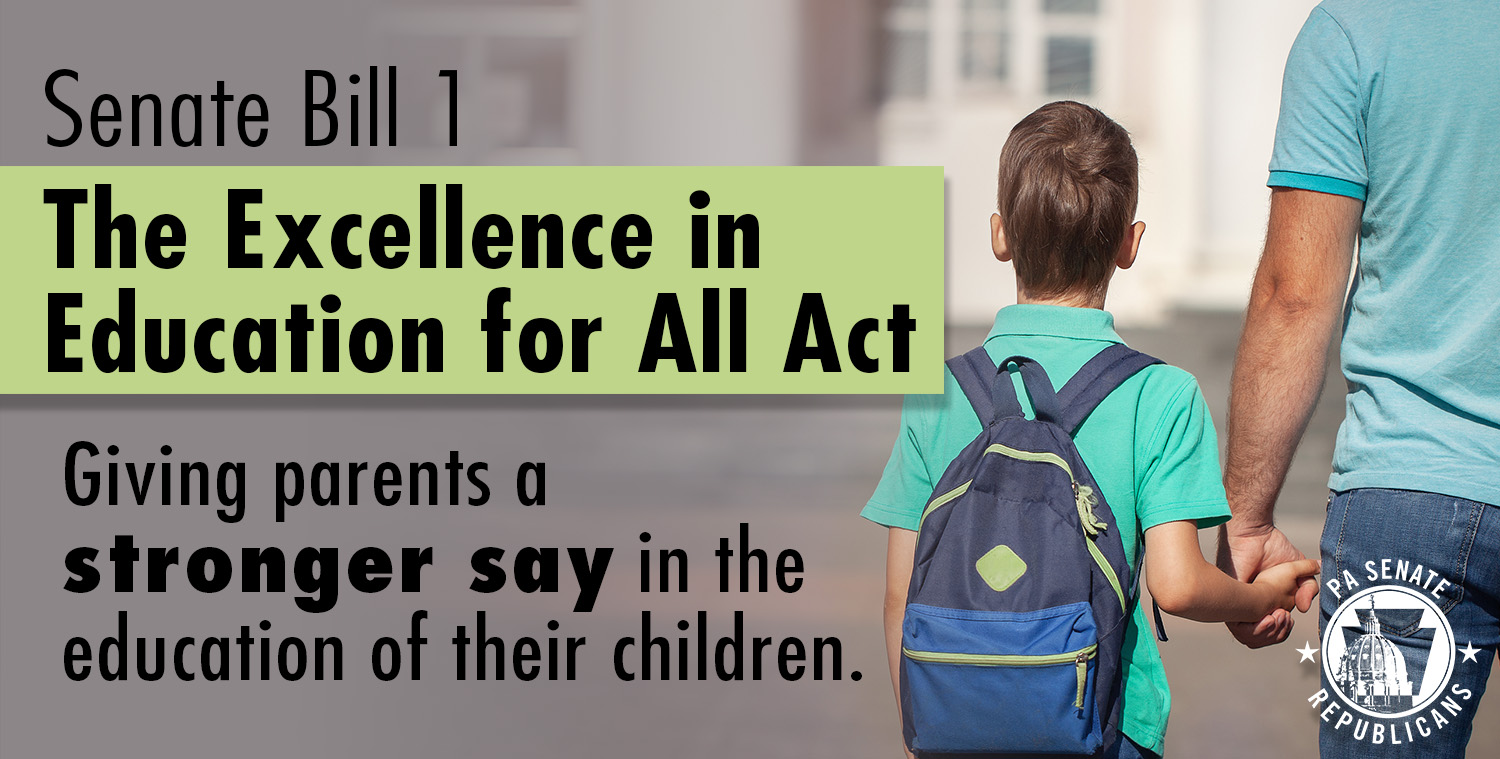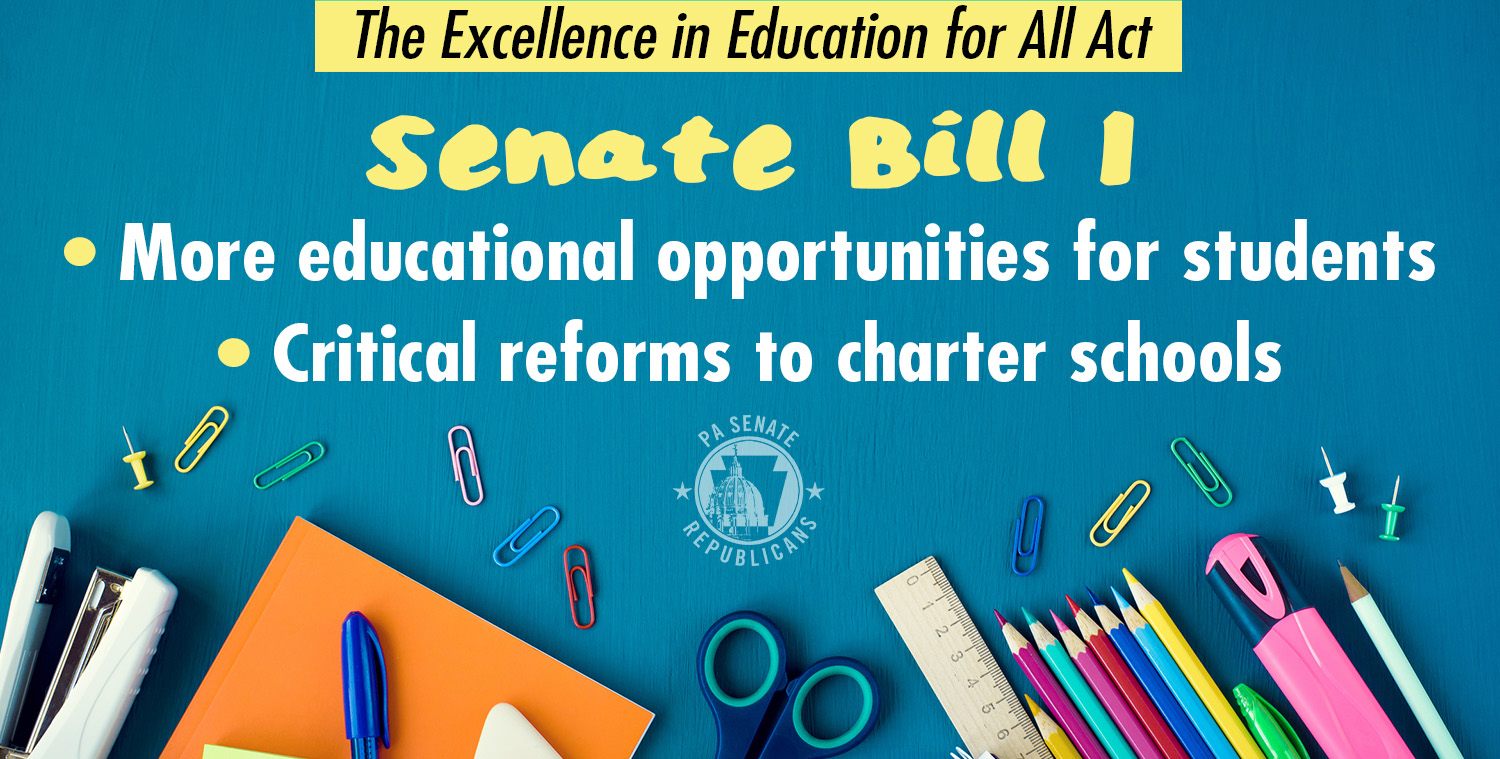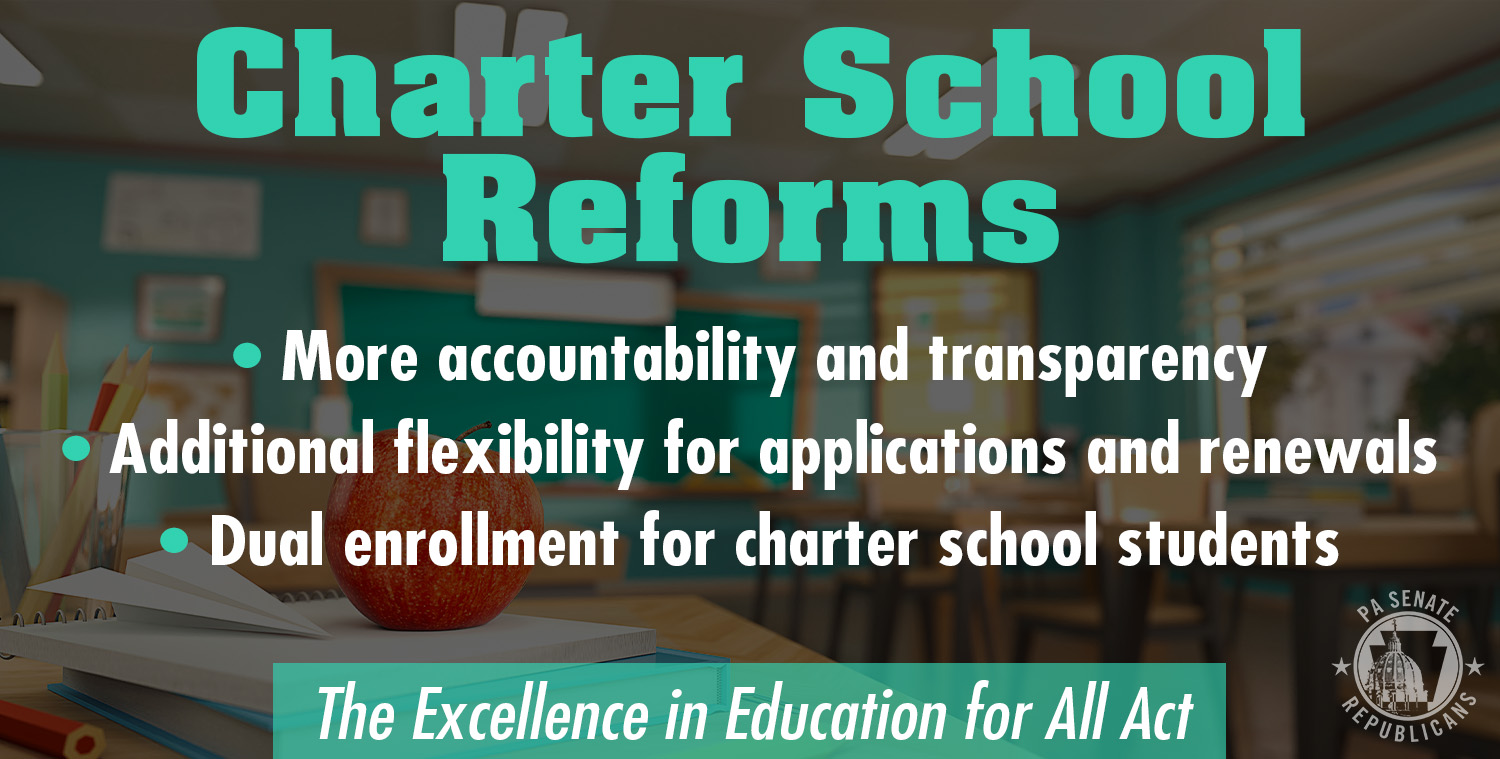Senate Bill 1
Supporting Education – Empowering Parents – Reforming Charter Schools

The Excellence in Education for All Act recognizes that parents know what is best for their child’s education. The bill is designed to provide a broader range of education options to students and parents and ensure young people are put in the best position to succeed academically.
The COVID-19 pandemic changed the way we look at education. One of the lessons we learned over the past year is that we need to provide a wide variety of options to meet the educational needs of each individual student – not make all young people conform to one model that may be less effective for certain students.

The bill contains two main components:
- Increased support for the highly successful Educational Improvement Tax Credit (EITC) and Opportunity Scholarship Tax Credit (OSTC) programs to give parents more say in the education of their kids, while providing a broader range of opportunities for young people.
- Critical reforms to state laws pertaining to charter schools, including new measures to make these schools more accountable and transparent while streamlining the process for these schools to be authorized and renewed.

EITC and OSTC Funding Increases
Educational Improvement Tax Credit (EITC) and Opportunity Scholarship Tax Credit (OSTC) programs offer a proven model of success in boosting student achievement and creating better educational outcomes for students.
According to data from the Department of Community and Economic Development, more than 60,000 students received scholarships through these programs in the most recent year for which figures are available; however, nearly 43,000 applicants were denied due to lack of funding.
Senate Bill 1 would dedicate additional funding to these programs to ensure more students can attend a school that meets their unique needs.

Charter School Reforms
Many more families have opted to enroll their children in charter and cyber charter schools over the past year. However, charter schools have reported concerns with the application and renewal process, while public schools have raised issues about the transparency and accountability of charter schools.
Senate Bill 1 addresses concerns from both sides. The bill would:
- Apply stronger accountability and transparency measures for charter schools.
- Include more flexibility in the application and renewal process.
- Allow charter school students to participate in dual enrollment programs.
Testimonials – Why Are These Programs Important?
April 12 Hearing
“I decided to enroll her temporarily with the plan of reentering our school district for 3rd grade. I didn’t expect to fall in love.” Cyber charter school parent Nicole Lillich testified about the value of educational choice and how it helped her children during a public hearing on April 9.
Senate Bill 1 would reform Pennsylvania’s charter school law to ensure students can continue to have access to a wider variety of educational opportunities.
April 12 Hearing
“The reality is, unless we stick with the EITC and OSTC, we will not be able to better ALL schools.”
Harrisburg Families United CEO Najimah Roberson, a single parent of three children, spoke about the importance of the state’s EITC program.
Senate Bill 1 would increase funding for the EITC and OSTC programs to ensure more parents have the power to choose the schools that are best for their children.
April 12 Hearing
“I am proof of a return on investment.” Lancaster Catholic High School student Nevin Roman testified at an April 13 Senate Education Committee hearing about the lifelong benefits he will receive thanks to the state’s EITC program.
Senate Bill 1 would help more students like Nevin benefit from educational opportunities that are best suited for their unique needs.
April 19 Hearing
“I actually was exercising a powerful choice – a choice that allows me to access the best education for me and my future.” Kevin McCoy, a TECH Freire Charter High School student in Philadelphia, explains how his charter school education makes a difference.
Senate Bill 1 includes measures to ensure students can continue to thrive in a charter school environment.
April 23 Hearing
“Each school has its strengths and weakness, and students should be able to choose which one is best for them based on their needs.” City Charter student Issac Gabriel from Pittsburgh testified about the benefits of having more educational options available to him.
Senate Bill 1 would help more parents and families choose from a wide range of educational opportunities.
April 23 Hearing
“I was praying for a miracle.” Allegheny County parent Maria Elizabeth Leon spoke about how EITC helped her kids get into a school that better met the unique educational needs of her children.
Senate Bill 1 would create more opportunities for parents to choose the school that is best for their children.
April 23 Hearing
“I have been given the most incredible opportunities in academics and other extracurriculars.” Cornerstone Christian Prep Academy student Bella Held spoke about the educational opportunities she received thanks to the state’s EITC scholarship program.
Senate Bill 1 would help more students like Bella to receive scholarships to attend the best school for their future.
April 23 Hearing
“Children can be saved by the ability of parents to select the educational program they feel is right for their child.” Allegheny County parent Sharon Sedler shared the educational improvements her children made after switching to a cyber charter school during COVID-19.
Senate Bill 1 would ensure parents can put their children in the best position to succeed academically.
April 19 Hearing
“I, for one, would never take this opportunity for granted because I feel like it has made me more independent.” Bishop McDevitt Catholic School alumnus Marie Sahou explains how EITC supported new educational opportunities that have enriched her life.
Frequently Asked Questions
How would Senate Bill 1 boost student achievement?
How would Senate Bill 1 give parents more power to make educational choices for their children?
The state’s highly popular EITC and OSTC programs allow private companies to give back to their communities by funding scholarships for families who wish to send their child to a different educational environment. In current practice, many families are turned away from the program due to a lack of funding. Senate Bill 1 would help more students participate.
Would Senate Bill 1 negatively impact public schools?
No. Evidence also shows that the fiscal impact on public schools is also a net positive when students pursue other learning opportunities outside of public schools. In fact, 25 studies show that instead of “draining money” from public schools, school choice programs have saved taxpayer dollars.
If more students choose options outside of public schools, what happens to the students who remain in the school district?
If more families move their children to different learning environments, the children who remain would benefit from smaller class sizes and more funding on a per-pupil basis. At least 31 studies have found that school choice actually improves academic outcomes for children who remain in public schools.
Senate Education Committee Public Hearings – Improvements in Education
The Senate Education Committee held three public hearings in April to explore the need for education reforms. The hearings played a key role in shaping Senate Bill 1. Video of the hearings is available below.
April 12, 2021
Public hearing on pursuing excellence: needed K-12 education reforms in central Pennsylvania
April 19, 2021
Public hearing on needed K-12 education reforms in eastern Pennsylvania
April 23, 2021
Public hearing on pursuing excellence: needed K-12 education reforms in western Pennsylvania
